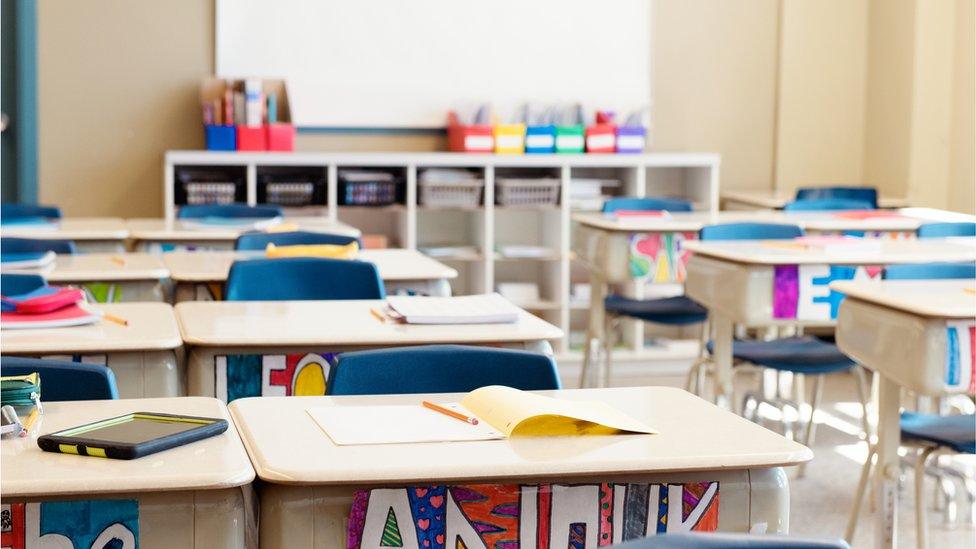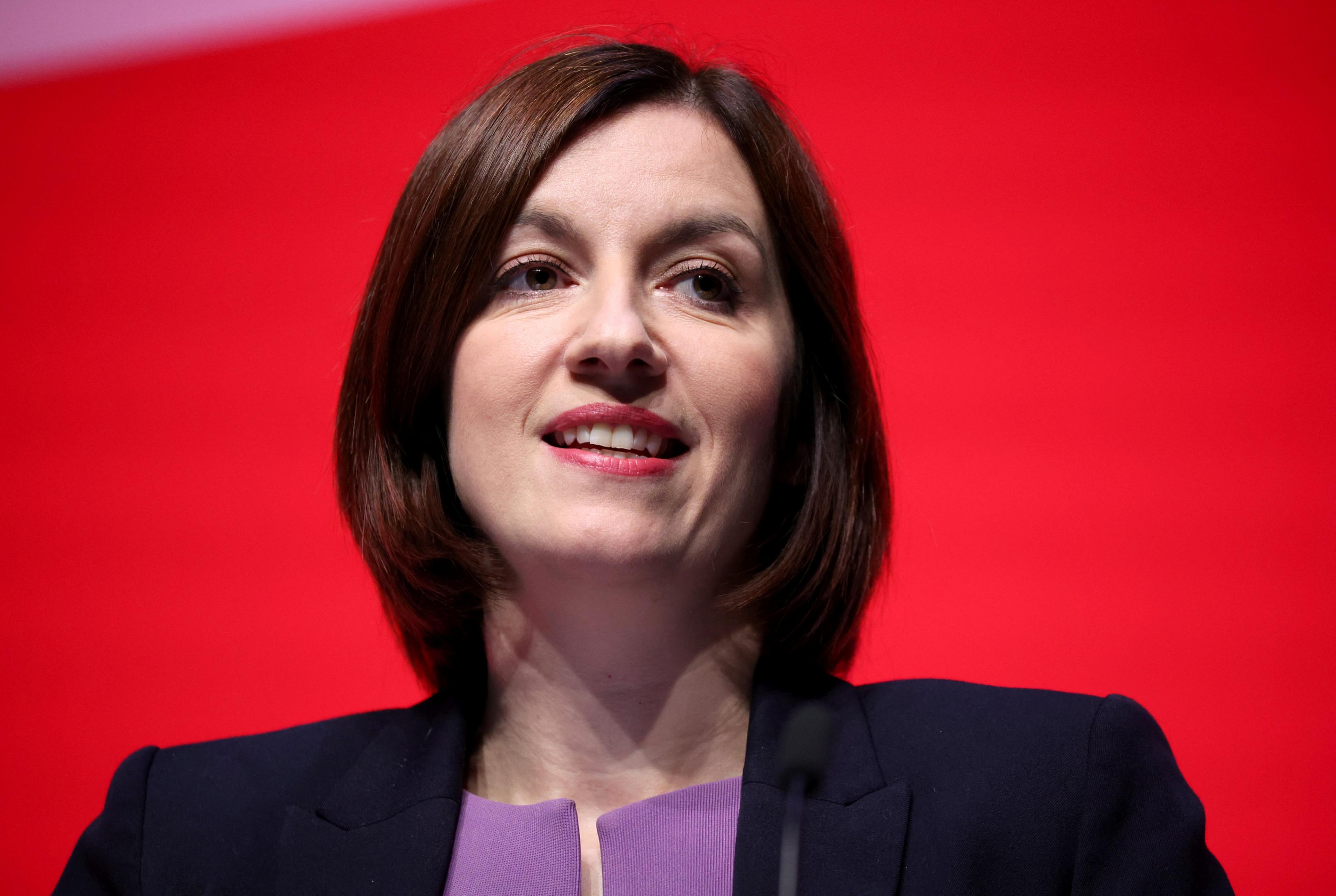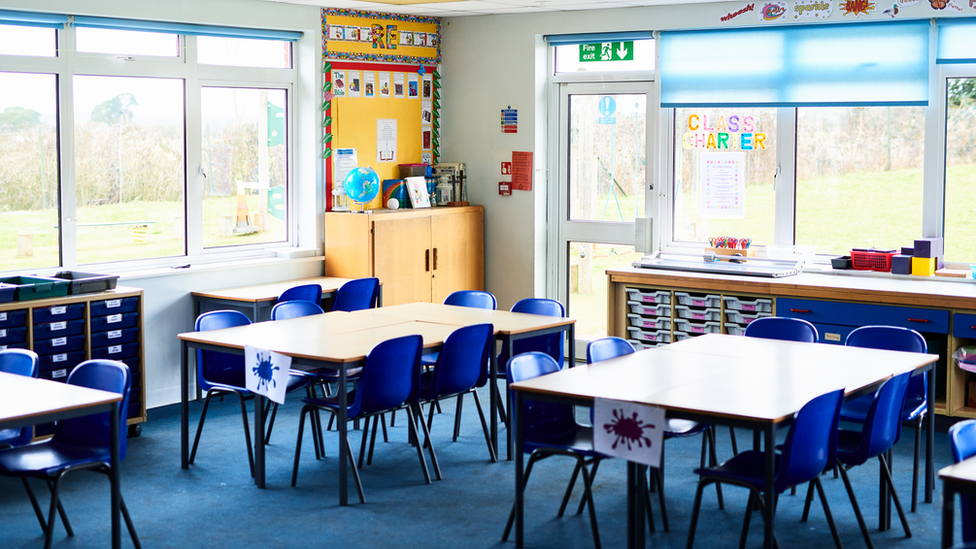Labour proposes free breakfast clubs to tackle persistent school absence
- Published
- comments

More than one out of every five children in England are persistently absent from school
Better mental health support for pupils would be part of Labour's plans to improve school attendance in England.
Shadow education secretary Bridget Phillipson set out the proposed measures, including free breakfast clubs for primary schools, at an event at the Centre for Social Justice (CSJ) on Tuesday.
The plans also include increased funding for early speech and language interventions.
This week, the government promised to extend the existing attendance-hub scheme to support a thousand more schools in England.
"Every day our children are in school is so incredibly important," said Phillipson. "It damages their life chances when they aren't there.
"So it's about that partnership we need to see between parents and schools, but also between schools and government, because governments have responsibilities as well."
Among Labour's plans to tackle persistent absence is the creation of a national register for home-schooled pupils, designed to track children who are not in mainstream schooling.
The proposals also include using Ofsted to review attendance data, and employing AI to spot trends in absence by linking with existing records in other services such as social care.
Ms Phillipson told the BBC these measures would be funded by "ending the tax breaks that private schools enjoy".
Department for Education (DfE) data, external shows more than one out of every five children in England are persistently absent from school - double the proportion before the Covid pandemic.
Persistent absence means missing at least 10% of school days - about four full weeks from the academic year.
A CSJ report last week suggested more school sport could help, but also found some parents thought children did not need to be in school full-time.
The DfE says parents have a duty to ensure children attend school.

Bridget Phillipson said Labour plans to make persistent school absence a top priority if elected
On parents' role in improving pupil absence, Ms Phillipson said: "I think we also have to be clear that parents have responsibilities as well.
"It's about everyone involved working together, pulling together to make the difference that we need as a country because it damages us all.
"When children are not in school, it's not just those children who are missing out, but all of us as a society as well."
Labour's plans are being backed by Sir Kevan Collins, the former school catch-up tsar.
Sir Kevan highlighted the impact of the pandemic on school absence and educational attainment, calling the current situation "a real crisis".
"Covid has cast a long education shadow and unfortunately, for some children, they're still suffering the consequences of learning loss," he told BBC News.
"All too often, the response to the pandemic has been piecemeal and, in my view, half-hearted."
'Maxed out'
Boris Johnson appointed Sir Kevan in February 2021, to advise the government on helping England's schools recover and create a long-term plan to help students catch up on learning after the pandemic.
"I'm a Labour Party sympathiser but I was happy and honoured to go and support a Conservative prime minister," Sir Kevan said.
"We all had to stand up and do our part."
But he resigned a few months later, after the government allocated £5bn in funding, rather than the £15bn he had advised.
"The phrase that was used was that we were 'maxed out on recovery' - and I don't think we ever maxed out on recovery," Sir Kevan said.
"We left schools too often on their own to resolve this.
"For too many children in our most vulnerable communities, we failed them and let them down."
'Best start'
On Monday, the government announced £15m worth of investment over three years to address school attendance issues.
The DfE promised 18 new attendance hubs - bringing the total to 32 across England - providing tailored support to pupils at 2,000 schools, up from 1,000.
The government also plans to provide more targeted and intensive support to more than 10,000 severely absent students and their families.
Conservative MP Robin Walker, chair of the education select committee, told the BBC's Radio 4 Today programme that the government should focus on the increasing number of students missing up to half their time in school - so-called severe absences.
Mr Walker said he supported a public information campaign to inform parents what the "right conditions" were for students to stay home because of illness, and when they should go in to school nonetheless.
Education Secretary Gillian Keegan called attendance issues her top priority.
"We want all our children to have the best start in life because we know that attending school is vital to a child's wellbeing, development and attainment," she said.

Are you affected by the issues raised in this story? Share your experiences by emailing haveyoursay@bbc.co.uk, external.
Please include a contact number if you are willing to speak to a BBC journalist. You can also get in touch in the following ways:
WhatsApp: +44 7756 165803
Tweet: @BBC_HaveYourSay, external
Please read our terms & conditions and privacy policy
If you are reading this page and can't see the form you will need to visit the mobile version of the BBC website to submit your question or comment or you can email us at HaveYourSay@bbc.co.uk, external. Please include your name, age and location with any submission.
Related topics
- Published7 January 2024

- Published3 September 2023

- Published16 May 2023
